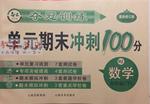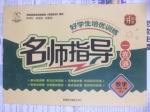题目内容
The patient will have to remain in hospital for another week ____the recent medical report.
A. on behalf of B. on the basis of C. on the side of D. on top of
B

 夺冠训练单元期末冲刺100分系列答案
夺冠训练单元期末冲刺100分系列答案 新思维小冠军100分作业本系列答案
新思维小冠军100分作业本系列答案 名师指导一卷通系列答案
名师指导一卷通系列答案I believe listening is powerful medicine. Studies have shown it takes a ___36___ about 18 seconds to interrupt a patient after he begins talking.
It was a Sunday. I had one last patient to see. I ___37___ her room in a hurry and stood at the doorway. She was an old woman, sitting at the edge of the bed, ___38___ to put socks on her swollen(肿胀)feet. I crossed the threshold(门槛), spoke quickly to the nurse, and scanned her chart noting she was in stable condition. I was almost in the clear.
I ___39___ on the bedrail(床的栏杆)looking down at her. She asked if I could help put on her socks. Instead, I launched into a monologue(独白) that went ___40___ like this, “How are you feeling? Your sugars and blood pressure were high ___41___ they’re better today. The nurse mentioned you’re ___42___ to see your son who’s visiting you today. It’s nice to have family visit from far away. I bet you really look forward to seeing him.”
She ___43___ me with a serious, authoritative voice. “Sit down, doctor. This is my story, not your story.”
I was surprised and embarrassed. I sat down. I helped her with the socks. She began to tell me that her only son lived ___44___ from her, but she had not seen him in five years. She believed that the stress of this ___45___ greatly to her health problems. After hearing her story and putting on her socks, I asked if there was anything else I could do for her. She ___46___ her head no and smiled. All she wanted me to do was to listen.
Each story is different. Some are detailed; others are vague. Some have a beginning, middle and end; others wander ___47___ a clear conclusion. Some are true; others not. Yet all those things do not really matter. What matters to the storyteller is that the story is heard without ___48___, assumption or judgment.
Listening to someone’s story costs ___49___ expensive diagnostic testing but is key to healing and diagnosis.
I often thought of ___50___ that woman taught me, and I ___51___ myself of the importance of stopping, sitting down and truly listening. And, not long after, in a(n) ___52___ twist, I became the patient, with a diagnosis of multiple sclerosis(多发性硬化症) at age 31. Now, 20 years later, I sit all the time in a wheelchair.
For ___53___ I could, I continued to see patients from my chair, but I had to resign when my hands were affected. I still teach medical students and other health care professionals, but now from the perspective(角度) of physician and patient.
I tell them I ___54___ the power of listening. I tell them I know firsthand that immeasurable healing ___55___ within me when someone stops, sits down and listens to my story.
| 【小题1】 |
|
| 【小题2】 |
|
| 【小题3】 |
|
| 【小题4】 |
|
| 【小题5】 |
|
| 【小题6】 |
|
| 【小题7】 |
|
| 【小题8】 |
|
| 【小题9】 |
|
| 【小题10】 |
|
| 【小题11】 |
|
| 【小题12】 |
|
| 【小题13】 |
|
| 【小题14】 |
|
| 【小题15】 |
|
| 【小题16】 |
|
| 【小题17】 |
|
| 【小题18】 |
|
| 【小题19】 |
|
| 【小题20】 |
|
Alzheimer’s disease is a major national health problem. Nearly 2 million Americans over the age of 65 have Alzheimer’s disease. It is a leading cause of death among the elderly. But Alzheimer’s disease is not confined (限于) to the aged. There may be a million or more people under the age of 65 suffering from the disease.
At one time, people suffering from the disease were said to be “getting old”. The disease was thought to be a natural part of growing old, but it is now known that Alzheimer’s disease strikes young and old alike. It is an organic (器官的) disease that destroys brain cells.
Alzheimer’s disease affects the patient’s memory, speech, and movement. In the beginning stages of the disease, the patient may seem slightly confused. He may have trouble speaking, then the patient’s memory begins to fail. He may forget dates, numbers, names and plans.
As the disease progresses, the patient may not recognize family and friends. These symptoms(症状) often cause terrible anxiety in the patient. He may feel lost and frightened. Sometimes the patient reacts with wild and bad behavior.
In the last stages of the disease, the patient may not be able to take care of himself. He may have lost the ability to speak and walk.
Scientists don’t know exactly what causes Alzheimer’s disease. It may be caused by a virus (病毒).It may be caused by a poisonous substance(物质) in the environment. At present, there is no cure for the disease. But there are ways to slow its progress. Exercise and physical treatment can help the patients of this disease.
【小题1】The main idea of the passage is that Alzheimer’s disease ________.
| A.is a terrible part of the aging process |
| B.is an organic disease that affects young and old |
| C.can be cured by physical treatment |
| D.causes forgetfulness |
| A.forgetfulness | B.difficulty in speaking |
| C.loss of sight | D.loss of the ability to walk |
| A.Poisons produced by the brain. | B.Getting old. |
| C.A virus. | D.Lack of exercise. |
| A.operation | B.a change in environment |
| C.medicines | D.physical treatment and exercise |
完形填空(共20小题;每小题1.5分,满分30分)
阅读下面短文,从短文后各题所给的A、B、C、D四个选项中,选出最佳选项。
Nowadays, a hospital always manages to keep its beds full. This is good on the one hand, and it’s bad on 36 hand.
One day, I went to see a sick friend at the hospital. I first went to the 37 desk, where I could get a permit to visit the patient.
38 I could ask which room my friend was in, the lady set down my name, age, filled out a form and 39 a bell. I was just about to tell her what I was coming for when two men arrived with a wheelchair, 40 me in it and pushed me down the hall.
“I’m not 41 ,” I shouted. “I’m just looking for a friend.”
“When he comes,” one man said, “we’ll 42 him up to your room.”
In a minute I 43 myself in a small room. In no time they undressed me and covered some other things 44 me. One man said “If you need anything, press the button.”
“I want to get my 45 back.” I begged.
“Oh, you can 46 us,” a voice said, “Even if the 47 happens, we will see that your wife will get everything.” They left and locked the door 48 them.
I was trying to think of how to escape by the door when Dr. Ward came in with several of his 49 .
“Thank God you finally came,” I said.
“It hurts that badly?” he asked.
“No, on the contrary, I am not ill 50 .”
Dr. Ward looked 51 . “If you don’t feel any pain, that means it’s much more 52 than we expected.” Then he turned to his students: “This is the most difficult kind of patient to deal with because he refuses to 53 that he is ill. __54__ he won’t tell us where it hurts, he will never be well again until we find the hurt out for 55 by doing exploratory surgery (手术探查) .”
|
1. |
|
|
2. |
|
|
3. |
|
|
4. |
|
|
5. |
|
|
6. |
|
|
7. |
|
|
8. |
|
|
9. |
|
|
10. |
|
|
11. |
|
|
12. |
|
|
13. |
|
|
14. |
|
|
15. |
|
|
16. |
|
|
17. |
|
|
18. |
|
|
19. |
|
|
20. |
|